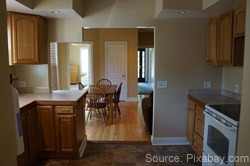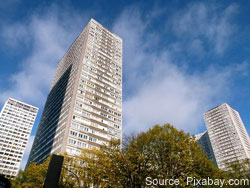
Apartment hunting can be exciting, but looking for the
perfect place to live is a process that you'll have to go about carefully and
it's definitely not something you want to rush into. You'll likely get a chance
to see many apartments during your search, but only a few of them will really
stand out to you. When it comes to time to make your decision and pick out the
place where you'll be living for the next several years, you want to make sure
that it has everything you need and that everything is as advertised. In other
words, you want to make sure that there won't be any unpleasant surprises
popping up a few weeks or months after you've signed the lease.
The key
to being a smart renter and finding an apartment that will suit all of your
needs is weighing all of your options and carefully checking out each place that
you visit to make sure that it fits your criteria. There are different rules and
regulations for each apartment that you will look at, and these rules are
typically set by the building owner or landlord. Doing your due diligence and
finding out everything you need to know about an apartment beforehand is the
best way to make an informed decision on which apartment will be best for
you.
So even if you've found the place that you think is right for you,
before putting your name on that lease, it's a smart idea for you to do a
complete and thorough walk-through of the apartment to make sure that all
appliances and utilities are in good working condition and that all other
aspects of the apartment are up to code and are suitable for living.
What to look for during your walk-through
Before you sign any
papers or leases and certainly before you move in, request to the landlord or
building owner that you see the apartment and have a chance to do a
walk-through. Many landlords will not offer this opportunity to you unless you
specifically ask, so it's important that you do. Also, make sure that you visit
the actual apartment you'll be renting, and not just a similar empty apartment
or model.
As for what you need to check during your walk-through, here
are some of the most important things that you'll need to keep your eyes peeled
for when you inspect the apartment:
Water/Plumbing
- Check the apartment's water pressure and temperature. At the start of
your walk-through, check out the water pressure in the bathroom and make sure
that it's at a comfortable level. Also, see how long it takes for the water to
adjust to a comfortable temperature, especially if you like to take hot showers.
Leave the shower running while you walk through the rest of the apartment and
when you come back to the bathroom, see if it's still warm. Many apartments have
shared hot-water heaters and this means that you may run out of hot water
quicker if you like to take long showers.
- Check all faucets, toilets and pipes for signs of leaks. You
certainly don't want to rent a leaky apartment with puddles in the bathroom
every time you shower or flush the toilet, so make sure to check all of the
faucets and pipes for any signs of leaking. Also, if there is a hot-water heater
in the apartment check it for any signs of rust or leaking.
- Check the ceilings for any signs of water damage. If there are any
leaks in the upstairs apartment, it may show up on your ceiling in the form of
water spots that can be troublesome if it is not taken care of, and can even
harbor mold, which can be harmful to your health.
Appliances/Utilities
 Make sure all appliances work properly. This one
should go without saying, but it's still important enough to include on this
list. All appliances that come with the apartment should be in good working
condition. If there is a refrigerator, stove, microwave, or anything else, you
should check it to confirm that there is no obvious damage to them. If there is
a washer and dryer in the apartment, check those as well. If there isn't, ask
the landlord to show you the room where they are located and make sure that the
room is in a safe location and is well-lit.
Make sure all appliances work properly. This one
should go without saying, but it's still important enough to include on this
list. All appliances that come with the apartment should be in good working
condition. If there is a refrigerator, stove, microwave, or anything else, you
should check it to confirm that there is no obvious damage to them. If there is
a washer and dryer in the apartment, check those as well. If there isn't, ask
the landlord to show you the room where they are located and make sure that the
room is in a safe location and is well-lit.
- Check for any electrical shortages. When you walk into each room of
the apartment, flip on the lights and then turn them off again to check for any
electrical shortages. If there are any lights that don't turn on, lights that
flicker or lights that take too long to come on, bring it up with the landlord.
- Check all of the electrical outlets. Checking the outlets in the
apartment might be hard to do without something to plug into them, unless you're
an electrician with the proper instruments. Bring along your cell phone charger
so you can plug it into the outlets in the apartment and test each one to see if
they are working properly.
Doors/Windows
- Check all windows for drafts or openings where air can come in.
There's nothing worse than a drafty window in the winter when you're trying to
stay warm on the couch and watch a movie. During your walkthrough, run your
hands by all of the windows to make sure that you can't feel any drafts of air -
hot or cold - coming from outside.
- Check all doors to make sure they are sturdy and can open and close
properly. Your doors are not only your method of getting in and out of your
apartment, but they're also your main source of security from the outside world.
It's important to check each one to make sure it is secure and sturdy and sits
correctly within the door frame. Also, all doors leading to the outside should
be equipped with a deadbolt and all locks should function properly.
Safety
- Make sure the apartment is equipped with fire extinguishers. All
apartments should have at least one fire extinguisher. If the apartment is
located above the ground floor, check for fire escapes and make sure that there
are easy exit points in case of a fire or other emergency that would require you
to evacuate your apartment quickly.
- Check that all smoke detectors and carbon monoxide detectors are
functioning. Test each smoke detector and carbon monoxide detector to make
sure that it has batteries installed and that it is in working condition.
- Check all cabinets for insects/rodents and look for all evidence of
insects or rodents throughout apartment. The cabinets are the preferred
hiding spot for insects and small rodents, so make sure you check those while
you're inspecting the apartment. Also keep an eye out for dark areas and corners
where insects like to make their homes.
- Document all evidence of damage and any imperfections you notice.
During your walk-through, you may stumble upon something that is broken or a
small dent in the wall or scratch in the floor. If so, take a picture of it and
document it so that you won't be forced to surrender your security deposit when
your lease is up and you move out.